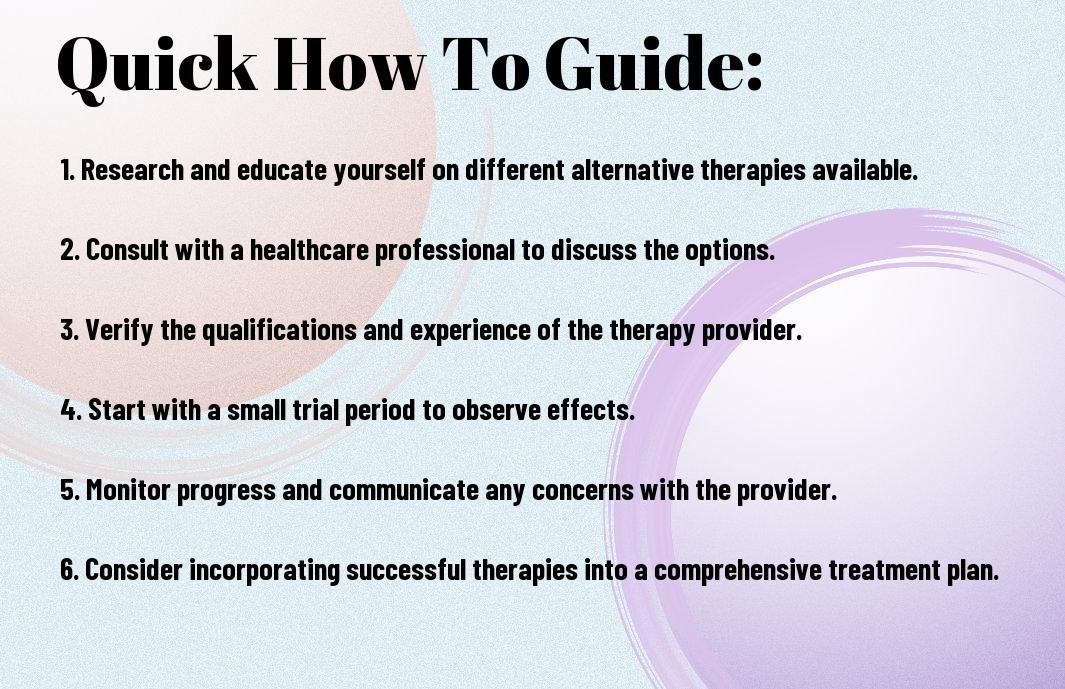Many parents of children with developmental delays may consider alternative therapies to complement traditional treatments. While these therapies can offer hope and potential benefits, it is crucial to proceed with caution to ensure safety and effectiveness. This guide will provide useful tips on how to navigate the world of alternative therapies for developmental delays, avoid potential risks, and make informed decisions for your child’s well-being.
Table of Contents
Key Takeaways:
- Consult with a healthcare professional: Before starting any alternative therapy for developmental delays, it’s crucial to consult with a healthcare professional to ensure it is safe and appropriate for your child.
- Research the therapy: Do thorough research on the alternative therapy you are considering, including any potential risks or side effects, and make sure it is evidence-based.
- Look for certified practitioners: If you decide to pursue an alternative therapy, look for certified practitioners who have training and experience working with children with developmental delays.
- Monitor progress: Continuously monitor your child’s progress while undergoing alternative therapy and communicate regularly with your healthcare provider to evaluate its effectiveness.
- Integrate therapy with conventional treatments: Alternative therapies should complement, not replace, conventional treatments recommended by healthcare professionals. It’s important to have a comprehensive treatment plan that addresses all aspects of your child’s development.


Understanding Developmental Delays
What are Developmental Delays?
One of the first steps in exploring alternative therapies for developmental delays is to understand what these delays actually are. Developmental delays refer to when a child does not reach developmental milestones within the expected time frame.
Common Types of Developmental Delays
To effectively explore alternative therapies, it’s crucial to be aware of the common types of developmental delays. These may include speech and language delays, fine motor delays, gross motor delays, cognitive delays, and social-emotional delays. After identifying the specific type of delay, interventions can be tailored accordingly.
| Speech and Language Delays | Fine Motor Delays |
| Gross Motor Delays | Cognitive Delays |
| Social-Emotional Delays |
Plus, it’s important to consult with healthcare professionals for a comprehensive evaluation to determine the specific developmental delays a child may be experiencing. After obtaining a clear diagnosis, appropriate interventions and therapies can be implemented to support the child’s development.
Importance of Early Intervention
Delays in addressing developmental delays can have long-lasting effects on a child’s overall development. Early intervention plays a crucial role in providing children with the necessary support and resources to help them reach their full potential.
Understanding the importance of early intervention is important as it can lead to significant improvements in a child’s developmental outcomes. With timely and appropriate interventions, children can make positive strides in their development and overcome many of the challenges associated with developmental delays.
Researching Alternative Therapies
How to Evaluate Online Resources
Resources to review when researching alternative therapies for developmental delays should include peer-reviewed articles, reputable health websites, and expert blogs.
Identifying Credible Sources
Any information you gather should be from credible sources such as universities, medical institutions, or well-known experts in the field.
With the rise of misinformation online, it is crucial to double-check the credentials of the authors and the sources referenced in the content.
Understanding Scientific Evidence
Some alternative therapies may lack solid scientific evidence to support their effectiveness in treating developmental delays. It is crucial to be cautious when considering these options.
Plus, consulting with healthcare professionals or therapists who specialize in developmental delays can help you make informed decisions about alternative therapies.

Factors to Consider When Choosing an Alternative Therapy
Your child’s journey towards overcoming developmental delays can be supported by alternative therapies. When choosing the right approach for your child, there are several factors to take into consideration. Knowing these factors can help you make informed decisions for your child’s well-being.
Age and Developmental Stage of the Child
While considering alternative therapies, it is crucial to take into account the age and developmental stage of your child. The therapy chosen should be developmentally appropriate and tailored to meet your child’s specific needs at their current stage of development.
Severity of the Delay
Factors such as the severity of your child’s developmental delay should also be considered when selecting an alternative therapy. Understanding the extent of the delay can help in choosing therapies that target the specific areas needing improvement.
Developmental delays can encompass a wide range of challenges, from mild to severe, and the chosen therapy should be tailored to address these specific needs.
Parent-Child Relationship Dynamics
The relationship dynamics between you and your child play a crucial role in the success of any therapy. It is important to consider how the chosen therapy may impact your relationship and ensure that it promotes positive interactions and bonding.
It is imperative to choose a therapy that fosters a supportive and nurturing environment, enhancing the parent-child relationship while addressing developmental delays.
Financial and Time Commitments
To ensure the effectiveness of the chosen therapy, it is necessary to manage and allocate the required financial resources and time commitments. Understanding the financial implications and time constraints involved can help you plan and commit to the therapy effectively.
Understanding and preparing for the financial and time commitments associated with alternative therapies can help in creating a consistent and beneficial treatment plan for your child’s developmental needs.
Tips for Working with Healthcare Professionals
To safely explore alternative therapies for developmental delays, it is crucial to collaborate with healthcare professionals. Here are some tips to facilitate a productive partnership:
- Building a Collaborative Team: There’s power in teamwork. Be open and honest with your child’s healthcare providers about the alternative therapies you are considering. Discuss how these therapies may complement traditional treatments and work together to create a comprehensive plan.
- Communicating Effectively with Your Child’s Doctor: Team up with your child’s doctor to ensure open communication. Be prepared to share information about the alternative therapies you are exploring and ask for their input. Together, you can make informed decisions about incorporating these therapies into your child’s treatment plan.
- Integrating Alternative Therapies into Traditional Treatment Plans: Professionals recognize the importance of bridging alternative and traditional treatments. By working with healthcare providers, you can develop a cohesive approach that considers the benefits and risks of each therapy. This collaboration can help optimize your child’s development and well-being.
After following these tips, consider exploring more about Complementary and Alternative Medicine Use in Children to deepen your understanding of integrating alternative therapies.
How to Identify Red Flags and Potential Risks
Warning Signs of Ineffective or Harmful Therapies
Not all alternative therapies are created equal. Some red flags to watch out for include promises of quick fixes, treatments that seem too good to be true, and therapists who are not properly licensed or accredited. It is necessary to do thorough research and consult with healthcare professionals before starting any new therapy.
Understanding Potential Interactions with Medications
To ensure safety, it is crucial to understand how alternative therapies may interact with any medications your child is currently taking. Some therapies can have adverse effects or diminish the effectiveness of prescribed medications. Always disclose all treatments to your healthcare provider to avoid any potential risks.
Ineffective or harmful therapies can worsen your child’s condition or lead to other health complications. It is important to be cautious and vigilant when exploring alternative treatments for developmental delays.
Recognizing Emotional and Financial Exploitation
Now, not only physical risks but emotional and financial risks should also be considered. Some therapists or providers may take advantage of vulnerable parents by promising unrealistic results or pressuring them into expensive long-term treatment plans. It is necessary to be aware of any signs of exploitation and seek advice from trusted professionals if you have any concerns.
Plus, always remember to prioritize your child’s well-being and safety above all else. Stay informed, ask questions, and trust your instincts when it comes to exploring alternative therapies for developmental delays.
Creating a Safe and Supportive Environment
After exploring alternative therapies such as Occupational Therapy for Developmental Delays, it is vital to ensure that the environment is safe and supportive for the individual undergoing treatment.
Setting Realistic Expectations
Now, it is crucial to set realistic expectations when launching on a journey with alternative therapies. Understanding that progress may take time and each individual responds differently to treatments can help manage your expectations and prevent disappointment.
Managing Stress and Burnout
Setting boundaries and taking care of your own well-being is vital in managing stress and preventing burnout. It’s important to recognize when you need a break and seek support from others to prevent exhaustion.
Fostering a Supportive Community
There’s power in having a strong support system around you when exploring alternative therapies. Surrounding yourself with understanding and encouraging individuals can make a significant difference in staying motivated and positive throughout the process.
Plus, participating in support groups or online communities can provide additional resources and insights into alternative therapies, creating a sense of camaraderie and understanding among individuals facing similar challenges.
Conclusion
Ultimately, exploring alternative therapies for developmental delays requires careful research, guidance from healthcare professionals, and a focus on evidence-based practices. By taking these precautions and considering factors such as safety, effectiveness, and individual needs, individuals can safely explore alternative therapies alongside traditional treatments to support the development of children with developmental delays.
FAQ
Q: What are alternative therapies for developmental delays?
A: Alternative therapies for developmental delays encompass a wide range of treatments and interventions that fall outside traditional medical practices. These may include approaches such as dietary interventions, sensory integration therapy, music therapy, and acupuncture.
Q: Are alternative therapies effective for addressing developmental delays?
A: The effectiveness of alternative therapies for developmental delays can vary widely. Some individuals may experience positive results from certain alternative treatments, while others may not see any significant improvement. It is important to consult with healthcare professionals and gather as much information as possible before trying any alternative therapies.
Q: How can I ensure the safety of alternative therapies for developmental delays?
A: To ensure the safety of alternative therapies for developmental delays, it is important to thoroughly research the treatment and practitioner, consult with healthcare providers, and consider any potential risks or side effects. Additionally, closely monitor the individual’s response to the treatment and be prepared to discontinue it if any negative effects occur.
Q: What should I consider before trying alternative therapies for developmental delays?
A: Before trying alternative therapies for developmental delays, it is necessary to consider the individual’s specific needs and challenges, research the credibility of the therapy and practitioner, consult with healthcare providers, and establish realistic expectations for the potential outcomes of the treatment.
Q: Can alternative therapies be used in conjunction with traditional therapies for developmental delays?
A: Alternative therapies can often be used in conjunction with traditional therapies for developmental delays. It is important to communicate openly with all healthcare providers involved in the individual’s care to ensure that there is a cohesive treatment plan in place. Additionally, monitoring the individual’s progress and being open to adjusting the treatment plan as needed is key.
Recent Posts
Revitalize your health with an innovative detox approach offered by Root Wellness. This powerful solution enhances wellness through natural ingredients like zeolite and silica, effectively cleansing...
Roots Clean Slate Erfahrungen Revitalize With Bioavailable Silicon
Revitalizing your health begins with a natural approach to removing harmful substances. Detoxification can pave the way for a more vibrant life through effective cleansing methods. Bioavailable...
